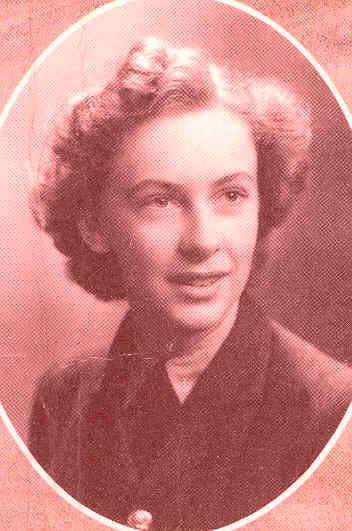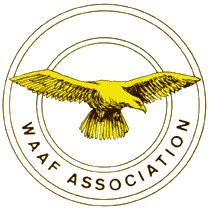This written account
was originally published in Radar: A Wartime Miracle Recalled
by Colin Latham and Anne Stobbs (1996).

Anne Stobbs
Life on a UK radar station
was unique: I doubt if any other RAF or WAAF personnel experienced anything
quite like it. Most stations were very small and had comparatively few
officers and NCOs. In fact, 'you'll get no promotion this side of the
ocean' very much applied to the trade of radar! The vast majority of
mechanics and operators never got higher than LAC/LACW in rank; I doubt
if any employer ever got such a bargain when you consider the qualities
the RAF demanded.
It was nobody's fault that
we got no promotion thi side of the ocean (nor, for that matter, on
the other side of the ocean). There simply wasn't 'room at the top':
each station had it requirement of different ranks, and once they were
in situ, that was that.
One of the strangest aspects
of life on a radar station was the total division between tech. and
non-tech. personnel. A-site and B-site. A-site was where the radar itself
was, and B-site was where we all lived, and never the twain did meet.
They were usually at least a mile apart, in case of air attack, but
they were a million miles apart metaphorically speaking. No non-tech.
people were ever allowed anywhere near A-site, and this included all
non-tech officers - the adjutant, the WAAF admin officer, the RAF Regiment
Officer, etc. So you had a situation where everybody wearing a sparks
badge on their arm would be spending three-quarters of their lives within
a compound which some of their own officers and all the other clerks,
cooks, drivers, etc on the camp were forbidden to enter and new next
to nothing about. Sometimes this did not make for easy relations - it
was bound to be a difficult situation, especially for the WAAF admin
officers who were in charge of our welfare and discipline, but who probably
had a suspicion that we were happy to be out of their reach most of
the time. Which was perfectly true - we were!

Radar Operators
In spite of this, the atmosphere
on most radar stations was marvellous. Within such a small group of
people, everyone knew everyone else; and the even smaller groups which
made up the watches became very close-knit; friendships were formed
which often lasted for life. We also had good friendships with our own
mechanics, who looked after the equipment and shared our 'tea-swindle'
suppers on nightwatch. Marriages bewteen radar folk were quite common.
The level of hardship resulting
from the climatic conditions on most radar sites generated a terrific
comeraderie - you had to cope, so you did cope, but you were
glad of a willing pair of hands to help you.
On most stations, some of
this hardship, plus the effects of working a watch system, were counteracted
by organising little concert parties and shows. All the local talent
was pressed into service, and a lot of fun ensued, for both the performers
and the audiences. There were always camp dances too, and liberty runs
into the nearest town, with ahppy sing-songs in the back of the transport
of the way home.
On watch we could relax in
the rest rooms, where we all apent 'off the tube'. One hour on was the
norm for operators; somebody had decided, quite rightly, that an hour
at a time of staring into a CRT was enough for your eyes and your powers
of concentration. So some of the watch was always in the quite comfortable
litlle rest room, brewing up tea, chatting, knitting, reading, writing
letters and, on nightwatches, frying up eggs and bacon to keep body
and soul together.
Nobody who worked on radar
is likely to forget that miserable feeling around two in the morning,
when your body was at its lowest ebb, crying out to be asleep, yet having
to force itself to stay awake. The atmosphere, especially in an underground
opes room, was really awful - dry and soporific, with incessant humming
from electrical apparatus.
And yet there were many compensations,
not least the feeling of intense pride we all had from doing a difficult,
technical and highly-secret job. Everybody on radar felt that they were
doing the job and wouldn't have done any other. And as far as
one knows, every single soul kept their mouths shut throughout the war
about what they were doing. (Even within one station, where there were
different radars, one didn't discuss what one was doing with people
working on different radar).
This special ethos was quite
amazingly rekindled fifty years later, when we started the big reunions.
700-strong or more, with ex-radar folk coming from Canada, the US, New
Zealand, South Africa - all suddenly re-experiencing that feeling of
pride in ourselves and in the job we had done all those years before.
The reunions also served
as a reminder of some of the enchanting names of the radar stations,
which will surely ring a nostalgic bell with all who ever them, either
through serving on some of them or talking to them on the intercom.
Most of them were names of tiny villages or simply local areas known
by those names. How about Tilly Whim, Stoke Holy Cross, High Street,
Stenigot, Gibbet Hill, Canewdon, Truleigh High, School Hill, Windyhead
Hill, Burifa Hill, Sligo, Brandy Bay, Rosehearty, Ottercops, Bawdsey
- names to bring the memories back?


![]()


